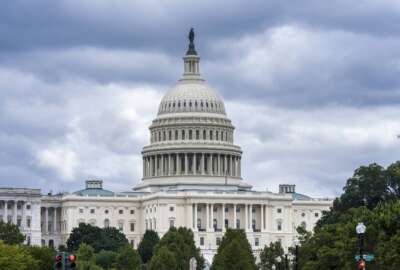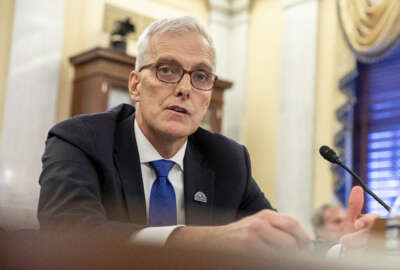FEMA’s post-Helene and Milton finances cause Congress to ponder returning early
The back-to-back hurricanes have left FEMA in financial difficulty, the agency says. So would that make Congress return early to appropriate disaster money?
The congressional recess continues. Members are mostly in their districts dealing with elections. The back-to-back hurricanes have left FEMA in financial difficulty, the agency says. So would that make Congress return early to appropriate disaster money? Bloomberg Government deputy news editor Loren Duggan joined the Federal Drive with Tom Temin to discuss possible options.
Interview transcript:
Tom Temin: So what is the real outlook there Loren?
Loren Duggan: Well, some agencies say they have money and others say they’re in need of it. Now FEMA, which you mentioned in your intro, is actually doing OK. They got a big influx of cash with the continuing resolution and they say at some point toward the end of the year, they may need some additional funding. But for right now, they’re OK. The agency that’s most in need, according to the president, is the Small Business Administration, which provides disaster loans to people in affected areas. And he said that might be an area where money is needed even sooner and call for Congress to come back.
Tom Temin: Alright, so what are the chances they’ll actually come back?
Loren Duggan: Well, Speaker Mike Johnson has so far not bitten on that last week. He said that, like I said, FEMA had the money it needed and that it would take time to add up all the costs in both the areas affected by Helene and the areas affected by Milton, the two different storms that have gone through. FEMA takes a while for some of that money to roll out there, have a Disaster Relief Fund, which is the main source of this and I think had billions of dollars left last week. So we’ll see going into a new week, and if pressure mounts, they could come back. And there’s a difference between maybe coming back a few people and coming back the whole chambers as we’ve seen in past disaster cycles.
Tom Temin: Right. And they can’t appropriate funds without everybody being there.
Loren Duggan: Right. I mean, they have, at times, had packages, especially disaster, where maybe the majority and the minority leader in the Senate can show up and maybe a few folks in the House. But if someone demands a vote and says they won’t let this money go out without some sort of arrangement, then they would potentially have to all come back if that was the urgent need and they had to go about that.
Tom Temin: And there might be a little bit of fatigue with the whole idea. I mean they just got through a whole big operation to get Veterans Affairs more money because it was running short because of the PACT Act claims and so forth.
Loren Duggan: That’s right. That was right before the end of the fiscal year. There was a supplemental for fiscal 2024, the year that just concluded, because there was a shortfall there. Disaster aid is something that has been requested by the administration and talked about, but the packages we’ve seen so far, whether it was the most recent continuing resolution or that larger supplemental bill this year that dealt with primarily Ukraine, Israel, Taiwan and some other things, didn’t address this disaster aid. And there are requests from the administration going back to the Maui fires to the collapse of the bridge near Baltimore and for some of the other disasters that had happened even before Helene and Milton. So there’s some like pent up need for disaster aid, plus this new and emerging need for disaster aid that could drive action.
Tom Temin: Yeah, it’s like the whole nation is a giant nest of baby birds with their beaks open, and Congress is trying to find the worms to drop into every beak.
Loren Duggan: Indeed. And one of the questions they have is do you give the money with an offset or without? Speaker Johnson, I believe, last week, said that maybe he would like offsets, though he acknowledged that would be difficult. That’s sometimes been a debate around disaster aid as well in recent years, do you just make an emergency money without an offset, or do you try to find cuts elsewhere in the budget that could be a fight that may, in fact, require people to come back to to have that discussion. But if nothing changes, the first day Congress would be in session is November 12th, about a week after the election.
Tom Temin: And to some degree, the hurricanes and the hurricane of the chatter stemming from the upcoming presidential election have pushed Ukraine off the front pages, so to speak, the homepages, and there’s no, at this point, effort or need or any kind of action forming to send more money over there that we know of.
Loren Duggan: No and the president, right before the end of the fiscal year, announced that he would send another package using the authority that he had up until that point. And so aid has flowed to Ukraine significant amounts over the last couple of years. I think the election and obviously the different stances taken by Vice President Harris and former President Trump may mean that Ukraine is watching the results of this election pretty closely as well and that might suggest what sort of aid could be done later this year or in future years, depending on the administration of the makeup of Congress.
Tom Temin: We’re speaking with Loren Duggan. He’s deputy news director at Bloomberg Government. And a related issue back to Florida is the insurance situation. The state officials talk about it like, ‘We’ll be fine, we’ll be fine.’ But the fact is that insurance is hard to come by or it’s prohibitive in Florida and that could happen maybe in North Carolina, around Asheville, for the same token, which means that there could be some consideration of federal intervention in that market?
Loren Duggan: Potentially or maybe a reexamination of the National Flood Insurance Program, which is the place where the federal government does have a role. It’s a program that has had obviously, a number of budgetary challenges, just given the number of claims over the years and the amount of flooding that goes on. If Congress needs to take action around that program as well to change some of the rules around it, that could be a discussion. The program is something that has to be reauthorized every so often, and has really been running on a series of extensions over time rather than really an evaluation of the program as a whole. We’ll see if, maybe coming out of this, and maybe this is more of a 2025, and beyond question. But do they have to re examine how those programs work and whether there needs to be a federal backstop for the states? That’s always one of those big questions. But it’s not like these incidents are stopping there if anything feels like it’s speeding up, right? There’s more of these storms. It feels like.
Tom Temin: Yeah, in fact, I was talking to someone who was in the brunt of the storm, but their house is 50 feet above sea level, so nothing bad happened. Trees fell and so forth. The door was literally bending in from the pressure of the wind like a horror movie. And this person said, ‘Well, their husband wants to keep everything bolted and all the storm shutters down.’ She said, ‘Well, there’s no more storms coming. He could open the storm shutters again.’ But people are a little bit shell shocked there, I guess, to use a bad analogy. And budget development, we’re in a CR that review for us how that runs, and any talk about appropriations at this point for 2025. that’s got to be job one when they return.
Loren Duggan: That might be job one or maybe job two, if the hurricane displaces that and there’s a need for emergency funding. The government’s funded through Dec. 20, which gives them about five weeks or so after the election to come back in talk about what they want to do, see if it’s a wrap it up this year, a plan, or maybe kick it into next year. You might recall the first House Republican continuing resolution went through March, which would have kicked it well into the next administration. So they have left it as a question open for the lame duck session when they come back. Haven’t heard much about what they want to do. Maybe some of these developments will factor in, but that will be a top priority for sure this fall and winter.
Tom Temin: All right. And then there’s the 2026 budget preparations, which are going on now. People that understand the crazy budgeting cycle of the U.S. government and that’s true of DoD and Bloomberg has done some work in that area. Some of your reporters.
Loren Duggan: That’s right, we focus a lot on the request when it arrives. But there’s a whole lot of action that goes on before that. My colleagues Tony Capaccio and Roxana Tiron had the chance to talk with Michael McCord, the comptroller at the Pentagon, who said this work is underway, and they expect it to be later than it normally is because it’s a new administration, even if it’s a Harris administration, Democratic, a lot of the same people, it will be a new administration. Might be slowed down if former President Trump wins, then we have a completely different administration and it’s anticipated that would take a while. So they’re about halfway done. From what he told my colleagues, there’s a lot of way to go. They have to figure it out. Figure out what the top line is going to be. But as you say, there’s a lot of work that goes on that people don’t pay attention to because it really is behind the scenes, but it’s very much top of mind for these top Pentagon officials what they’re going to do next year.
Tom Temin: Yeah, and earlier in this hour, I had an interview with David Grannis. He’s the executive director of the Commission on the National Defense Strategy, which issued what I thought was a blockbuster of a report a couple of months back on the kind of sorry state of the military and the budgeting system, and whether we could actually take on China and win. We could take them on, but we may not win. And I would think that would be alarm bells for Congress to start thinking seriously about defense budget priorities. But I think some members are interested. It did have bipartisan sponsorship that commission, but yet it doesn’t seem to have really dug that deeply that plow that they put out.
Loren Duggan: Yeah, I think reports like that get digested, maybe take time to work through. We did see Senate authorizers say they wanted more money for this current fiscal year in their authorization bill for DoD and other defense programs. So we’ll see if they win as they negotiate that bill, the NDAA plus appropriations letter this year. But those longer term questions about the U.S. strategy and what it means for our posture in the world, I think we will hear that in a new administration might kick things in a different direction with a new DoD secretary, or whatever it may be.
Tom Temin: And of course, part of the problem is not just the money, but also the process by which DoD grinds through what it does, which keeps it perpetually slow. But that’s a topic for another day. All right, so they’re gone again. They return when officially?
Loren Duggan: Barring emergency return, it would be November 12th, about a week after the election, right after the long weekend, and we’ll be digesting the election results and figuring out what it all means.
Tom Temin: And then, thinking about digesting Thanksgiving not too long after that.
Copyright © 2025 Federal News Network. All rights reserved. This website is not intended for users located within the European Economic Area.
Tom Temin is host of the Federal Drive and has been providing insight on federal technology and management issues for more than 30 years.
Follow @tteminWFED






